跨文化交际第二章文化与跨文化交际 ppt课件
大学跨文化交际ppt课件

3. 面对分歧与冲突:尊重对方观点,妥善 处理分歧,学会妥协与包容。
05
06
4. 实践建议:加强语言学习,提高沟通技 巧,主动参与社交活动,保持开放心态。
05
跨文化交际能力的培养与提升
增强文化意识与敏感度
01
了解不同文化的价值 观和世界观
深入了解不同文化的价值观和世界观 ,可以帮助我们更好地理解其他文化 ,避免跨文化交际中的误解和冲突。
发展
随着全球化的深入,跨文化交际研究逐渐涉及更多 领域,包括语言学、心理学、管理学等。
当代趋势
如今,跨文化交际能力被越来越多的行业和 领域视为必备技能,如国际商务、外交、教 育等。
02
跨文化交际的核心能力
文化敏感度
01 意识到文化差异的存在
02 理解和尊重文化差异
03
愿意学习和适应不同文化
语言能力
02
关注文化细节
在跨文化交际中,细节往往可以反映 出一个人的文化背景和习惯。增强对 文化细节的敏感度,可以帮助我们更 好地适应不同的文化环境。
03
培养文化包容心态
接受并尊重不同文化的差异,以包容 的心态去面对其他文化,可以增强我 们的文化意识,提高跨文化交际能力 。
提高语言能力与交际技巧
Hale Waihona Puke 学习目标语言在不同文化环境中进行决策和解 决问题的能力
03
在不同文化环境中处理冲突和压 力的能力
04
03
跨文化交际的挑战与应对策略
文化冲击与文化适应困难
总结词
文化冲击是指人们在接触另一种文化时,由于价值观、信仰、习惯等方面的差异,产生的困惑、恐惧和不安。
详细描述
文化冲击的症状包括孤独感、思乡病、易怒和焦虑等。适应新文化需要时间,正确认识和接受这种变化是克服文 化冲击的关键。
第二章 交际与跨文化交际PPT

2、跨文化交际学的研究方法和研究内容
• 与跨文化交际学关系最密切的有四门学科是文化人类学、 社会心理学、社会语言学和传播学。不同学科的学者在研究跨 文化交际时所取的角度不同,研究方法上亦有差异。
• 作为一门独立的边缘学科,跨文化交际学不仅研究文化的定 义与特点、交际的定义与特征以及文化与交际的关系,同时将干 扰交际的文化因素也作为它研究的重中之重。
(1)培养人们对不同文化持积极、理解的态度。在这个过程中,我 们能够加深对自身文化的理解,从而做到客观地把握各自的文化特性。
(2)培养跨文化接触时的适应能力。设法减缓冲击、提高适应能力 是使跨文化交际得以成功进行的唯一途径,这也是跨文化研究的一项 重要内容。
(3)培养跨文化交际的技能。在美国,除了在大学里设置了相关课 程以外,社会上也有许多机构专门负责跨文化交际技能的培训和进修, 以此来适应国际化社会的需要。正是基于这一点,跨文化交际研究的 实践意义要远远大于它的理论意义。
• 相比较而言,我国的跨文化交际研究的历史很短。上世纪八十年代中 期开始,我国学者们才注意到这方面的问题,其研究初期的重点是放在外 语教学以及文化及语言的关系上。自1982年许国璋先生发表论文 《CULTURALLY-LOADED WORDS AND ENGLISH LANGUAGE TEACHING》之后,学者们谈论文化差异的文章越来越多,并相继发表在 各种学术刊物上。
• 交际中,具有同一文化背景的人们可以进行有效地交流,而因为 共享有限的文化背景,来自不同文化中的人们,在交流时常常会产生 沟通的障碍。
• 这就是我们所说的跨文化交际。
一、交际的定义
• 《辞海》中“交际”词条下的释义:“敢问交际,何心也?” 朱熹注:“际,接也”。“交际”谓人以礼仪币帛相交接也。据 此意义,该词后来泛指社会各阶层成员交往中人与人的往来应酬。
跨文化交际第二PPT课件
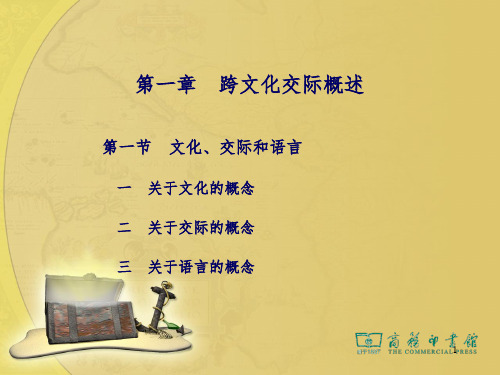
13
文化定势的特征
首先,定势和归类有一定的联 系,是过分简单化的归类。 其次,定势有不可避免性 再者,定势具有稳定性和延续 性。
14
第一章 跨文化交际概述
第一节 文化、交际和语言
4、亚文化
在文化学研究领域,通常把文化分为主流文化和亚文化。 也就是说,文化的概念具有层次性,一种整体文化中往往包含 了各种不同的次范畴“变体”,形成某种文化圈内的亚文化圈。
3
第一章 跨文化交际概述
第一节 文化、交际和语言
后来“文化”一词被日语借入,到近代作为英 语culture的对译词。再后来“文化”作为日语借词 又被现代汉语吸收,于是“文化”就同英语的 culture有了直接的词源关系,并衍生出“文明”、 “教育”等含义。
4
什么是文化?
文化离不开 人,是某一 群体的生活 方式。
第一章 跨文化交际概述
第一节 文化、交际和语言
一 关于文化的概念 二 关于交际的概念 三 关于语言的概念
1
第一章 跨文化交际概述
第一节 文化、交际和语言
一 关于文化的概念
(一)文化的定义
1.中西文化探源
“文化”的概念古已有之,指与“武力”相对的文德教化。
圣人之治天下也,先文德而后武力。凡武之兴,为不服也;文化不
第一节 文化、交际和语言
在文化学或文化人类学中,“文化”一词通常指人
类社会区别于其他动物的全部活动方式以及活动的产品。
就这一概念的核心内涵而言,它的意义是明确的。然而
专家们给“文化”所下的定义可以说各有千秋。在众多
的关于文化的定义中,文化人类学家泰勒(Tylor)和马
林诺夫斯基(Malinowski)的定义比较受人推崇。前者
《跨文化交际》课件

2
基本规则
了解跨文化交际的基本规则,如注重非语言沟通、避免使用俚语和难懂的语言等方的文化背景和习惯,调整沟通策略,确保信息的准确传达。
解决跨文化交际中的问题
1 展示文化敏感性
在跨文化交际中,需要对不同文化背景的人 表示尊重和理解。
2 调整沟通策略
针对跨文化交际中遇到的问题,我们可以根 据对方的习惯和背景,调整沟通策略,解决 问题。
案例研究
跨文化交际成功案例
一位跨国公司的领导成功地进行了跨文化沟通,在 不同国家的员工中建立了良好的合作关系。
跨文化交际失败案例
因为文化差异,一个国际项目中的交流出现了误解 导致该项目未能按时完成。
总结与讨论
反思课程内容
通过本课程的学习,您是否更好地了解了跨文化交际的重要性和技巧?
提出问题和建议
《跨文化交际》PPT课件
本课程旨在帮助您更好地了解跨文化交际的重要性和技巧,并掌握如何有效 地与不同文化背景的人交流。
什么是跨文化交际?
定义
跨文化交际是指在跨越不同文化背景的情况下进行的交流和互动。
重要性
随着全球化进程的加快,跨文化交际的重要性越来越受到重视。
挑战
不同文化之间的交流可能会面临很多挑战和障碍,需要我们采取有效的沟通策略。
在跨文化交际的实践中,您是否遇到了问题?为了更好地提高跨文化交际的能力,您有什么 建议?
文化差异
不同的文化特征
每个文化都有自己独特的特征,例如语言、信仰、 价值观和习俗。
文化差异的影响
文化差异可能会影响人们的观念、行为和与他人的 交流方式。
文化融合
跨文化交际也是文化融合的过程,可以促进不同文 化之间的理解和尊重。
跨文化沟通技巧
《跨文化交际》课件

尊重他人
尊重和接受不同文化的观点 和做法。
发展人际关系
建立良好的人际关系有助于 跨文化交际的顺利进行。
结论和总结
跨文化交际是一个复杂而有趣的领域,它可以丰富我们的视野,增进人与人之间的理解和合作。在全球化的时 代,跨文化交际的重要性不可忽视。
自由民主
西方社会价值观的核心之一,强调个人自由和人权。
摇滚音乐
西方音乐文化的代表,让人们释放情感和表达自我。
跨文化交际的概念
跨文化交际是指不同文化背景的人之间进行有效沟通和交流的过程。
跨文化交际的重要性
1 提高理解力
通过跨文化交际,我们能够更好地理解和尊重他人的文化。
2 促进合作
跨文化交际有助于不同文化背景的人们共同合作解决问题。
《跨文化交际》PPT课件
跨文化交际是研究不同文化间的交流,了解和尊重不同文化背景的重要性。
中国文化
长城
茶道
中国古代的伟大建筑物,象征着 中国的辉煌历史和文化的丰富性。
中国独特的文化艺术,展示了对 礼仪和和谐的追求。
书法
中国的艺术形式,以笔刷和墨水 书写汉字,传承了上千年的历史。
西方文化
圣诞节
西方重要的节日,在这一天人们庆祝和分享快乐。
3 推动创新
不同文化间的交流和碰撞能够激发创新思维,产生新的想法和解决方案。
跨文化交际中的挑战
1
语言障碍
不同语言之间的差异可能导致交流困难。
2
文化差异
不同文化的价值观和习俗可能造成误解和冲突。
3
沟通风格
跨文化交际中的沟通方式和风格可能不同,需要灵活适应。
跨文化助于更好 地交流和理解。
跨文化交际第二章文化与跨文化交际

The Basic Function of Culture
❖ At the core of culture is the idea that it is intended to make life easier for people by “teaching” them how to adapt to their surroundings.
Generation. ❖ Culture Is Based on Symbols. ❖ Culture Is Subject to Change. ❖ Culture Is an Integrated System. ❖ Culture Is Ethnocentric.
Culture Is Not Innate; It Is Learned.
❖ The English admire good manners, courtly behavior, and dignity, as is reflected in the “Canterbury Tales”.
❖ The Japanese learn about the importance of duty, obligation, and loyalty from “The Tale of the Forty-Seven Ronin”.
Proverbs
❖ "One does not make the wind blow but is blown by it."
❖ "Order is half of life."
❖ "The mouth maintains silence in order to hear the heart talk."
跨文化交际概论 ppt课件
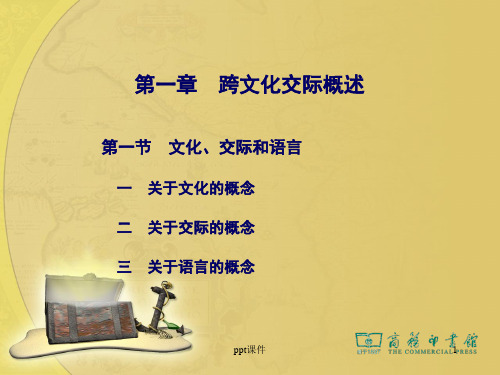
ppt课件
3
第一章 跨文化交际概述
第一节 文化、交际和语言
在文化学或文化人类学中,“文化”一词通常指 人类社会区别于其他动物的全部活动方式以及活动的 产品。就这一概念的核心内涵而言,它的意义是明确 的。然而专家们给“文化”所下的定义可以说各有千 秋。在众多的关于文化的定义中,文化人类学家泰勒 (Tylor)和马林诺夫斯基(Malinowski)的定义比较 受人推崇。前者着眼于文化的整合性和精神性,后者 着眼于文化的功能性和制度性。
ppt课件
9
第一章 跨文化交际概述
第一节 文化、交际和语言
在文化学研究领域,通常把文化分为主流文化和亚文化。 也就是说,文化的概念具有层次性,一种整体文化中往往包含 了各种不同的次范畴“变体”,形成某种文化圈内的亚文化圈。
亚文化产生于亚群体,亚群体是某个民族内部的群体分化, 他们在亚群体中享有共同的信仰、价值观、行为准则、交往规 范以及认知模式。不同亚群体之间在所觉、所思、所言、所为 等方面都存在一定的差异,因此,亚文化与主流文化之间,既 有“大同”的一面,也有“小异”的一面。
广义:指人类在历史发展中所创造的物质财富 和精神财富的总和。
在通常情况下,提到“文化”人们首先想到的 是它的狭义方面,即文化的精神形态方面。
ppt课件
8
第一章 跨文化交际概述
第一节 文化、交际和语言
2 .文化定势
世界上大多数社会中都可能存在着若干群体或社团,这 些群体或社团对地域、历史、生活方式以及价值观等方面的共 享,使其成员形成、发展并强化了自己独特的文化及与之相适 应的交际文化。在跨文化交际研究中,学者们往往倾向于把某 一文化群体的每一个成员都视为该文化定势的代表或整体文化 形象。这种整体式的文化取向通常被称为文化定势。
跨文化交际完整第二章文化与跨文化交际

Human beings draw close to one another by their common nature, but habits and customs keep them apart.
❖ Some people shake hands when introduced to a stranger, but other people bow at such an encounter. Why?
.
Culture
❖ Definitions of culture are numerous. ❖ We define culture as the deposit of knowledge,
❖ As the English writer Thomas Fuller wrote 200 years ago, "Culture makes all things easy."
.
Characteristics of Culture
❖ Culture Is Not Innate; It Is Learned. ❖ Culture Is Transmitted from Generation to
.
The Basic Function of Culture
❖ At the core of culture is the idea that it is intended to make life easier for people by “teaching” them how to adapt to their surroundings.
The formal teaching of a culture is far more structured and is often left to the various institutions of the culture, such as schools and churches.
Cross-cultural Communication 跨文化交际 PPT课件 (2)

5.Case studies
Mutual Monitoring Process
Xiu went to a BC buffet reception in the BC headquarters in Beijing. It just so happened that Xiu arrived a little too early. The waiting lounge was almost empty except a charming lady sitting at a corner seat. After a long interval of unbearable silence Xiu decided to break the silence by approaching the lady.
Yes, but not good
1.An orator delivers a speech to a large gathering. 3. You send an e-mail message to an American friend. 4.Jane lies in bed reading a novel.
Model Two: unilateral-cultural model
(one knows another’s language and cultural environment but the other one doesn’t)
Lu Bing ,a Chinese tour guide is talking in English with George Luke, a British tourist who does not know Chinese at all.
Activity 3: Meanings in communication
跨文化交际与跨文化交际学PPT课件

③ 王福祥、吴汉樱编,《文化与语言》(外语教 学与研究出版社,1994)。
.
27
2)90年代中期以后
出版学术专著 发表相关论文 召开学术研讨会
1995年8月,中国跨文化交际研究会在哈
尔滨成立,此后,每两年召开一次全国性 会议。
.
28
学术专著
关世杰:《跨文化交流学》(北京大学出版社,1995)
第二讲 跨文化交际与跨文化交际学
.
1
一、跨文化交际(intercultural communication)
(一)交际的过程和类型
行为源
编码,形成信息,通过渠道
解码,反应,通过渠道反馈
反应者
交际是一个(或多个人)对另一个人(或 多个人)的行为或行为遗迹作出了反应。
.
2
交际的类型
划分标准
交际类型
格林教授和夫人鞠躬 敬请赐复。
.
36
Invitation
Director of the Institute of Atomic Energy requests the pleasure of the company of
Mr. and Mrs. Dickens at a dinner party
in honor of Mr. Liu Wenling senior engineer of the Institute of Atomic Energy
.
30
一些不宜用“姓+职务”表示的词
中国文化中称呼“姓+职务”这种类型的,有 些翻译成英文不宜直译,如主任、局长、科长、 老师等。
对于教师的称呼很多,主要有三种: Sir./Ms.;
Mr./Ms.+姓;直呼其名。 不能是“姓+teacher”,也不能是直呼别人
跨文化交际unit 2 课件
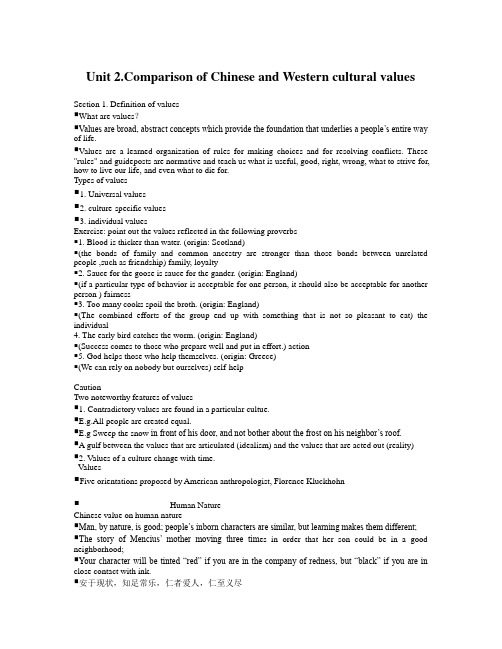
Unit parison of Chinese and Western cultural values Section 1. Definition of values▪What are values?▪V alues are broad, abstract concepts which provide the foundation that underlies a people‘s entire way of life.▪V alues are a learned organization of rules for making choices and for resolving conflicts. These "rules" and guideposts are normative and teach us what is useful, good, right, wrong, what to strive for, how to live our life, and even what to die for.Types of values▪1. Universal values▪2. culture-specific values▪3. individual valuesExercise: point out the values reflected in the following proverbs▪1. Blood is thicker than water. (origin: Scotland)▪(the bonds of family and common ancestry are stronger than those bonds between unrelated people ,such as friendship) family, loyalty▪2. Sauce for the goose is sauce for the gander. (origin: England)▪(if a particular type of behavior is acceptable for one person, it should also be acceptable for another person ) fairness▪3. Too many cooks spoil the broth. (origin: England)▪(The combined efforts of the group end up with something that is not so pleasant to eat) the individual4. The early bird catches the worm. (origin: England)▪(Success comes to those who prepare well and put in effort.) action▪5. God helps those who help themselves. (origin: Greece)▪(We can rely on nobody but ourselves) self-helpCautionTwo noteworthy features of values▪1. Contradictory values are found in a particular cultue.▪E.g.All people are created equal.▪E.g Sweep the snow in front of his door, and not bother about the frost on his neighbor‘s roof.▪A gulf between the values that are articulated (idealism) and the values that are acted out (reality)▪2. V alues of a culture change with time.V alues▪Five orientations proposed by American anthropologist, Florence Kluckhohn▪Human NatureChinese value on human nature▪Man, by nature, is good; people‘s inborn characters are similar, but learning makes them different;▪The story of Mencius‘ mother moving three tim es in order that her son could be in a good neighborhood;▪Y our character will be tinted ―red‖ if you are in the company of redness, but ―black‖ if you are in close contact with ink.▪安于现状,知足常乐,仁者爱人,仁至义尽▪Relationship of human to natureChinese traditional medicine shows the cultural value of harmony with nature▪Westerners: A minor illness like cold - work as usual; human body is an object that can be studied and then controlled---leading to the invention of powerful medicines, but the medicines may have unpleasant or even dangerous died effects.▪Chinese: cold- stayed home to give body a chance to recover. The human body is part of nature and needs to be brought back into balance. Medi cine should work with the body‘s own resources. It should be integrated with the body, so it will take longer to work.▪Sense of timeActivity---case study▪When a middle age American couple showed up to help a young Chinese couple move into their new apartment, they were surprised that the Chinese couple would not allow them to do any work. Instead they found a place for them to sit and gave them tea.▪Why?▪Activityconflict▪Westerners: experience the talk and behavior of Chinese people as performance, as dramatization of the self and as not very relevant to what is important; their conversation is lacking in information.▪Chinese: showing that they are friendly, virtuous, or sufficiently important; they are educated, polite, humble, high-ranking or hospitable.▪―我爸是李刚。
跨文化交际第二章文化与跨文化交际ppt课件
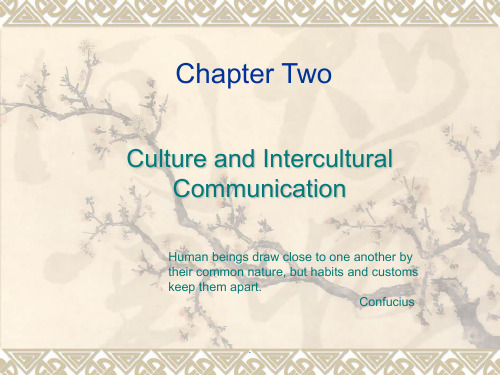
Culture
❖ Some people in many parts of the world put dogs in their ovens, but people in the United States put them on their couches and beds. Why?
❖ Some people in Iran pray five times each day while sitting on the floor, but some people in Las Vegas sit up all night in front of video poker machines. Why?
Confucius
.
Warm-up Case
❖ Fish Is Fish
.
Learning Objectives
❖ Define the term of culture ❖ Describe the characteristics of culture ❖ Understand the nature of culture ❖ Be aware of cultural differences
Learning Culture through
Proverbs
❖ "One does not make the wind blow but is blown by it."
❖ "Order is half of life."
❖ "The mouth maintains silence in order to hear the heart talk."
The formal teaching of a culture is far more structured and is often left to the various institutions of the culture, such as schools and churches.
跨文化交际(4组)PPT课件

.
20
• 习语的凝固性
• 又称为习语的固 • 不能把
定性,与中国汉 语的成语一样,
• rain cats and dogs (倾盆大雨)
它的词、形式、 结构都是固定的, 不能被更改、替 换。例如:
•
改成
rains dogs cats或
and
• rain a cat and a
dog 等形式。
.
21
上想到他性格豪爽,脾气暴躁的形象,“林
黛玉”英语中也有就代表弱不禁风,多头善
感的形象。但在西方文化中就仅仅是个人名。
在英语中,也有一些出自文学作品和历史事
件的人名或地名,具有其独有的特殊内涵意
义,如Cinderella(指不受重视的人或部门,
或指有才干但一时未受赏识的人),Shylock
(指心肠狠毒、唯利是图的小人),地名
数字13:在西方文化中,普遍被认为是不吉祥的数字。但 在我国传统文化中,不具有这些内涵意义。
数字9:在中国传统文化中,就是历代君王都推崇的数字, 皇帝穿九龙袍,京城建九个城门,宫殿的台阶也是九层或 九的倍数。但在英语中nine却. 没有这样的文化内涵。 10
中国古代的文学作品中许多专有名词具有丰
富的文化内涵,比如人们一说“张飞”就马
.
31
习语
naked truth
kill the goose that laid the golden eggs
sour grapes bell the cat
cat’ paw
意义
原原本本的事实, 赤裸裸的事实 杀鸡取卵 涸泽而鱼
聊以自慰的话 替别人冒风险 被别人利用的人
the lion’s share .
跨文化交际实用教程unit2课件ppt共30页
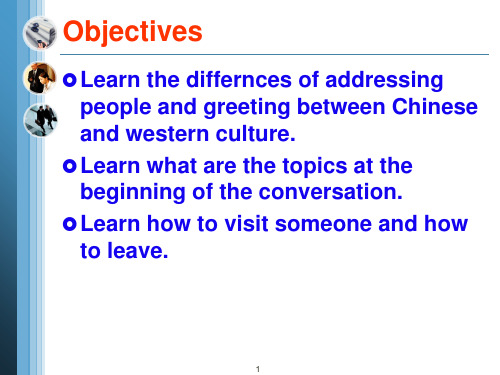
1
CONTENTS
I. Warm-up cases II. Detailed Study:
★Addressing People ★Greetings ★Initiating Conversations ★Visiting Someone ★Partings
■学术头衔
学术头衔的“副”职称,常用 associate 表示。如:
➢ 副教授 associate professor ➢ 副研究员 associate research fellow ➢ 副审判长 associate judge ➢ 副主任医师 associate doctor
10
2. Greetings
Please match the following two groups.
vice
director
associate
professor
assistant
manager
deputy
president
9
Tips:
■行政头衔
以“副”字的表示副职的行政职务头衔,可用 vice、 deputy 表达。在实际使用时究竟选用哪个,纯属搭配 习惯。一般来说,vice与president、 premier、 chairman、 minister、 governor搭配;deputy与 director、 chief、head 、secretary、dean、mayor 搭配。似乎可以认为,Vice比Deputy的搭配级别要高。
Close Relationship/ Informal Situation
Surname+Title Surname+Title
跨文化交际Unit-2第二讲PPT课件

2021/3/12
6
Chapter 1 Culture and Intercultural Communication
(2) How do you think of “self-reliance”?
• The American Creed is something of a doubleedged sword: it fosters a high sense of personal responsibility, independent initiative, and voluntarism ; it also encourages self-serving behavior, atomism, and a disregard for communal good. More specifically, its emphasis on individualism threatens traditional forms of community morality, and thus has historically promoted a particularly virulent strain of greedy behavior”
• Play a role • To feel an obligation toward
2021/3/12
跨文化交际(全套课件255P)

2021/6/6
第二语言教学的主要目标是培养学生的跨文化交际能力。
• 跨文化交际能力指的是跨文化交际环境中的交际能力,即来自不同文化背景的 人之间进行交际时,具有强烈的跨文化意识,善于识别文化差异和排除文化干 扰并成功地进行交际的能力。是在跨文化交际环境中由语言交际能力、非语言 交际能力、语言规则和交际规则转化能力以及文化适应能力所组成的综合能力。
• 交际双方进行的是实时的口语交际 ,即双方面对面的交谈。 • 交际双方进行的是直接的言语交际。基本上不涉及翻译问题,
而侧重语用规范,通过了解对方文化的价值取向和行为规范 协调双方交际中涉及的文化因素,从而保证交际的有效性。
2021/6/6
第二语言教学与跨文化交际
• 我们的目标不是要将自己的学生培养成外国人,而是将他们培养成沟通中外交 往的桥梁。使他们能够不断转换不同文化的规则和办事方法,帮助桥两头的人 相互适应,成功进行跨越文化的交际。
“夕阳无限好,何愁近黄昏。”
Most glorious is the sunset.Even the dusk is blessde.
“平时不烧香,临时抱佛脚。”
To offer no incense to Buddha when things go well and beseech his help only when in need.
2021/6/6
第二语言教学中需要处理好三种关系
1. 课堂教学与课外交际之间的关系,包括课本语言教学与课外应用指导之间的 关系。
2. 第二语言教学与第二文化教学之间的关系。 3. 培养学生的语言交际能力和培养他们的跨文化交际能力之间的关系。
跨文化交际实训课件Chapter-2

Language and culture 语言和文化
I. Verbal Communication 言语交际
High-context and Low-context language
高语境和低语境语言
High Context Less verbally explicit communication, less written/formal information More internalized understandings of what is communicated Multiple cross-cutting ties and intersections with others Long term relationships Strong boundaries- who is accepted as belonging vs. who is considered an "outsider" Knowledge is situational, relational. Decisions and activities focus around personal face-to-face relationships, often around a central person who has authority. Examples: Small religious congregations, a party with friends, family gatherings, expensive gourmet restaurants and neighborhood restaurants with a regular clientele, undergraduate on-campus friendships, regular pick-up games, hosting a friend in your home overnight.
- 1、下载文档前请自行甄别文档内容的完整性,平台不提供额外的编辑、内容补充、找答案等附加服务。
- 2、"仅部分预览"的文档,不可在线预览部分如存在完整性等问题,可反馈申请退款(可完整预览的文档不适用该条件!)。
- 3、如文档侵犯您的权益,请联系客服反馈,我们会尽快为您处理(人工客服工作时间:9:00-18:30)。
Culture Is Not Innate; It Is Learned.
Confucius
Warm-up Case
❖ Fish Is Fish
Learning Objectives
❖ Define the term of culture ❖ Describe the characteristics of culture ❖ Understand the nature of culture ❖ Be aware of cultural differencesin many parts of the world put dogs in their ovens, but people in the United States put them on their couches and beds. Why?
❖ Some people in Iran pray five times each day while sitting on the floor, but some people in Las Vegas sit up all night in front of video poker machines. Why?
Proverbs
❖ "One does not make the wind blow but is blown by it."
❖ "Order is half of life."
❖ "The mouth maintains silence in order to hear the heart talk."
❖ Some people paint and decorate their entire bodies, but others spend hundreds of dollars painting and decorating only their faces. Why?
❖ Some people talk to God, but others have God talk to them, and still others say there is no God. Why?
The formal teaching of a culture is far more structured and is often left to the various institutions of the culture, such as schools and churches.
Learning Culture through
experience, beliefs, values, attitudes, meanings, social hierarchies, religion, notions of time, roles, spatial relationships, concepts of the universe, and material objects and possessions acquired by a group of people in the course of generations through individual and group striving.
❖ Some people shake hands when introduced to a stranger, but other people bow at such an encounter. Why?
Culture
❖ Definitions of culture are numerous. ❖ We define culture as the deposit of knowledge,
Chapter Two
Culture and Intercultural Communication
Human beings draw close to one another by their common nature, but habits and customs keep them apart.
The Basic Function of Culture
❖ At the core of culture is the idea that it is intended to make life easier for people by “teaching” them how to adapt to their surroundings.
❖ Culture is learned in a variety of ways and from a host of different sources.
Informal learning, which is often very subtle, normally takes place through interaction, observation and imitation.
❖ "He who speaks has no knowledge and he who has knowledge does not speak."
❖ As the English writer Thomas Fuller wrote 200 years ago, "Culture makes all things easy."
Characteristics of Culture
❖ Culture Is Not Innate; It Is Learned. ❖ Culture Is Transmitted from Generation to
